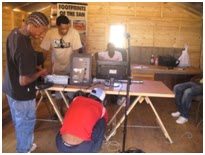 |
| Moshe Maghundu |
We are also doing interviews with the regions as well.
The regions are doing things on a different scale, and sometimes they are multi-skilling on a daily basis, such as Moshe Maghundu, Librarian AND Archivist at SABC Platfontein.
Moshe, please tell us a little bit about yourself. (Where you grew up, where and what you studied and your work experience before you joined SABC Platfontein)
My name is Moshe and my surname is Maghundu. My parents call me Kxoegoe, a typical San name. I grew up in the Republic of Namibia and I went to school while in Namibia till grade 12.
I continued my studies in Windhoek where I studied Theology at an institution called NETS (Namibia Evangelical Theological Seminar). I completed my Bachelor in Theology in four years.
While in South Africa, I got training at UNISA and I worked for the Linguistic department as a researcher in linguistics to the !un and Khwe languages of Platfontein.
I worked with a video camera recording different stories of the San. I had to burn it on a DVD and transcribe/translate the exact story to English. The final product was sent to UNISA for further usage.
That was my first work experience.
Please tell us more about SABC Platfontein.
SABC Platfontein-X-K fm has staff members from two of our communities, the !xun and Khwe. We have 8 deejays; 4 !xun and 4 Khwe to enjoy equal coverage. In addition to that, the station broadcasts in Afrikaans as well and cover news in languages spoken in South Africa.
We have two programme producers for SABC education. Our programme coordinator is a man and a !xun and our station manager is woman and from the Khwe community.
The radio station X-K fm is outside of Kimberley; 7km from Kimberley to the direction of Barkley west and we are in the Northern Cape.
Please tell us about a normal day in your office. What library or archival jobs do you give priority to?
My daily duties in this office are very hectic because I have two demanding jobs.
Library:
Deejays and the compilers come to borrow CDs.
I have to issue out and return these CDs daily.
I receive CDs from JHB which I have to capture or add shelf numbers on to the system and barcode them.
I have to return these CDs to their shelves and make sure that they are available and accessible.
Sound archives:
I get recorded DVDs of preselected radio programmes from main control.
I have to edit the archive audio and burn it onto a CDR, as well as design cover labels.
The next step is the capturing [Cataloguing] of the information of these CDs on NDMP (Natural Document Management).
I do video recordings as well. If there is a historical event that happens here I record and keep it for heritage and archival purposes.
Recently I have started collecting the San instruments, their art work and even drums for the archive.
This work is not specified in my job description, but I have realised that it is equally important as keeping the audiovisual heritage, for our elders are dying and these things might become extinct.
Tell us more about your collection and the scope of material you need to preserve in the library/archives.
I mentioned most already, but at the moment I’m busy with sound archives (audio).
Do you struggle with technical difficulties, and if so, what?
I have in my office the SABC Record Library computer, the archive computer with WaveLab software for sound editing and NDM for cataloguing. Attached to it are the audio mixer and Dalet (Digital Audio System) which I manage well.
My previous studies helped me a lot, and SABC gives training to be able to be very useful and productive in all that I do.
If you have an anecdote about a specific piece of interesting information, please share it with us.
One thing I have discovered about myself during my days with the SABC is the fact that the SABC is making me multi-talented.
I have to go out with my colleagues on outside broadcasts (OBs). I do musical recordings here at the station. When we experience a power failure and the generator fails, I have to help them out by fixing the problem.
When there is a Dalet problem, I run around helping the presenters /producers. I even assist with small problems with the computers.
I never got IT training, but my background studies at college helps me with it.
Tell us why you enjoy doing the work that you do.
One good reason why I enjoy the work I’m doing, is that I like very challenging work. The fact that music and broadcasting has always been my passion since childhood and finding me working for the department of my dreams is like a dream coming true!
That is why I am doing all that I am doing for the SABC.
Questions and blog post by Karen du Toit, SABC Radio Archives.







